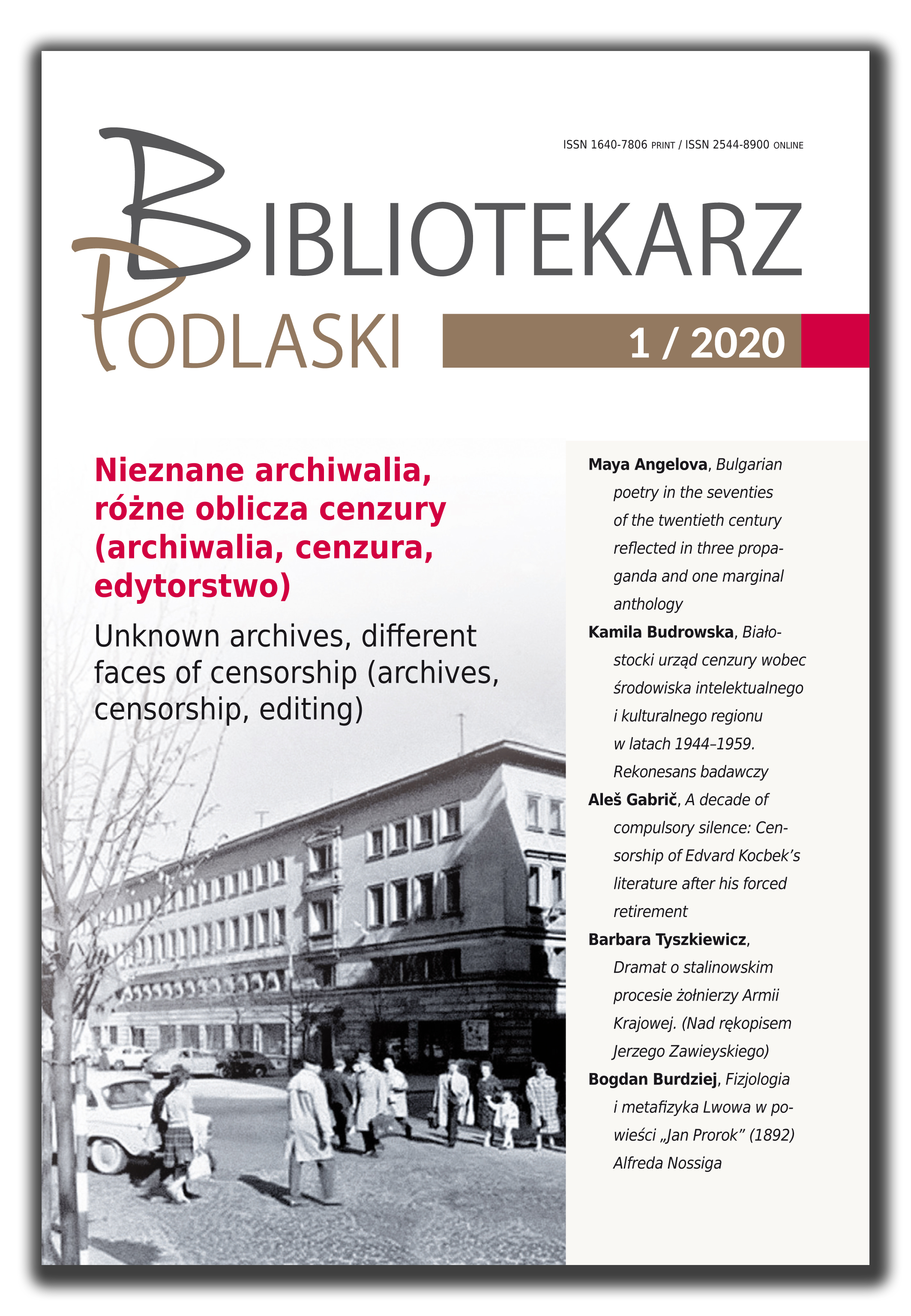Abstract
Artykuł sygnalizuje problem nieobecności Antoniego Madeja w dziejach literatury polskiej po II wojnie światowej. Za kluczowe dla takiego stanu rzeczy autor tekstu uznaje motywacje wewnętrzne, ale również okoliczności zewnętrzne. Wszystko to pozwala zdefiniować Madeja jako poetę wewnętrznie zaprzeczonego i obiektywnie, ze względu na oficjalny zakaz druku, skazanego na milczenie. Artykuł próbuje przypomnieć dorobek artystyczny Madeja, zachowany w postaci niepublikowanych maszynopisów. Szczególną uwagę poświęca się tu jednemu zbiorowi pisanemu w celi więziennej, noszącemu tytuł Liryki więzienne. Przegląd zawartości tego zbioru ma na celu ukazanie doświadczenia autora, ale też kształtu wrażliwości poety i specyficznej perspektywy rozumienia losu ludzkiego jako takiego.
References
Czernik S., Poeci Lubelszczyzny, „Kamena” 1934, nr 2.
Gralewski W., Stalowa tęcza, Warszawa 1968.
Kłak T., Miasto poetów. Poezja lubelska 1918–1939, Lublin 2001.
Kłak T., W krajobrazie Nałęczowa, Lublin 1983.
Listy do Kazimierza Andrzeja Jaworskiego [w:] Archiwum Muzeum Literatury im. J. Czechowicza w Lublinie.
Madej A., Jak stawiać opór pustce i ogniowi, wstęp i wybór E. Żuk, Warszawa 2004.
Madej A., Quo vadis ZNP? „Zet” 1936, nr 7.
Madej A., Ś.p. Bronisław L. Michalski, „Zet” 1935, nr 8.
Madej A., Wiersze wybrane, wstęp i oprac. E. Łoś, wybór J. Zięba. Lublin 2000.
Madej A., Wokół sprawy odejścia Czechowicza z ZNP czyli bajka o strasznym zbóju Madeju. [Na marginesie książki W. Gralewskiego pt. Stalowa tęcza], „Kamena” 1968, nr 20.
Napierski S., U poetów, „Wiadomości Literackie” 1932, nr 33.
Żuk E., Muza poezji w celi Jerzego Brauna, Kraków 1997.
Articles published in the “gold open access” mode on the basis of a non-exclusive license agreement between the publisher and the author. Permitted use:
- the publication may be read and stored on any device,
- the publication may be cited (with obligatory reference to the author, the title of the text, as well as the full title, bibliographic address of the issue and page of the journal)
The editorial team of “Bibliotekarz Podlaski” implements an open access policy by publishing materials in the form of the so-called Gold Open Access. From volume 42 (issue 1/2019), the journal is available under the Creative Commons license (Attribution – ShareAlike: CC BY-SA).
The key declarations of the Open Access and Open Science movement, which we fully support, are available on the CEON Open Science website.
COPYRIGHT:
The editorial team of “Bibliotekarz Podlaski” implements an open access policy by publishing materials in the form of the so-called Gold Open Access. The journal is available under the Creative Commons license – Attribution – ShareAlike 4.0: International: CC BY-SA 4.0).
The key declarations of the Open Access and Open Science movement, which we fully support, are available on the CEON Open Science website.
“Bibliotekarz Podlaski” allows its readers to read, download, copy, distribute, print, search and link to the full content of articles. We enable full, immediate, unlimited (both in a territorial, temporal and technical sense) open access to all published content, in accordance with the principle that freely available research increases and accelerates the global development of science and the exchange of knowledge.
The editorial team of “Bibliotekarz Podlaski” encourages authors to place articles published in the journal in open repositories (after the review or the final version of the publisher), provided that a link to the journal’s website is provided.
The journal does not charge the authors any fees for accepting and publishing their texts.


